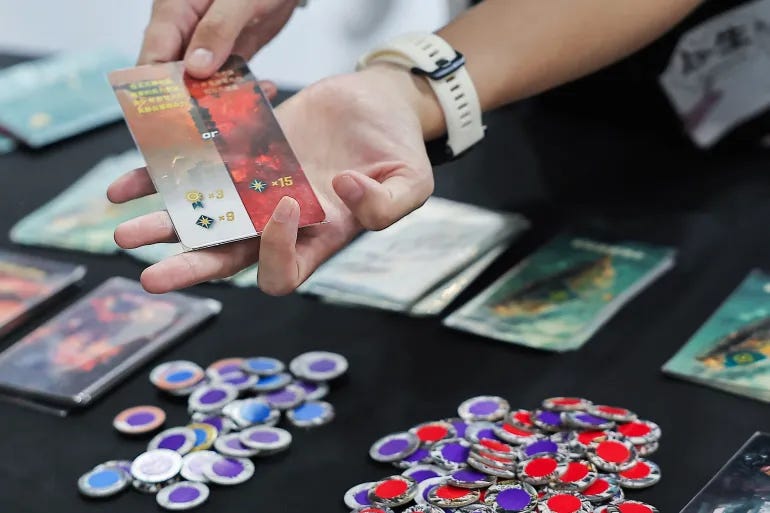Can a Board Game Help Taiwan Prepare for Potential Conflict with China?
A new game simulating a Chinese invasion of Taiwan offers players the chance to defend the island in the face of escalating tensions.
Taiwanese game developer Mizo Games is launching a new board game that allows players to simulate a fictional Chinese invasion of Taiwan. The game, titled 2045, invites participants to take on roles ranging from military commanders and undercover agents to civilian resistance fighters. Players are tasked with defending Taiwan in the lead-up to a simulated war with China.
Set to release in Taiwan this month, 2045 will also be available in English in Europe and the United States by the end of January. The game's crowdfunding campaign, which concluded in August 2024, raised over 4 million New Taiwan dollars ($121,707 USD) in just two and a half months.
Mizo Games' founder, Chang Shao Lian, explained in an interview with Reuters that the goal of 2045 is to engage players in thinking strategically about winning the fictional conflict: "I want players to feel they want to win and think about what they will do to win."
The game's release comes amid rising tensions between Taiwan and China, with China increasing military activities near Taiwan and Taiwan's civil defense groups preparing for the possibility of an invasion.
What Is 2045 About?
The game simulates a Chinese invasion of Taiwan set 20 years in the future, with players taking on various roles over the ten days leading up to the attack. Rather than simply focusing on the defense of Taiwan, the game evaluates players based on how well they achieve their character's specific objectives.
Shao Lian described the two possible outcomes of the game: an individual victory and a victory for Taiwan. The conflicting goals create an intense moral dilemma for players. “I don’t want players to play the game with just the mindset to learn, but I want them to play the game with the desire to participate in and win this war on the table,” he said.
In 2045, players engage in modern warfare scenarios such as cyberwarfare, economic collapse, and civil unrest, all of which mirror real-world challenges faced during a conflict.
Challenges in Creating 2045
The production of 2045 has faced several obstacles, including concerns about censorship and the challenges of manufacturing the game outside of China. Given the controversial nature of its content, the game cannot be produced in China, which marks a shift from the usual production methods employed by Taiwanese game developers.
Mizo Games’ History in Warfare-Themed Games
This is not Mizo Games' first foray into war-themed board games. In 2017, they released Raid on Taihoku, a World War II game set in Taiwan. Players must survive the 1944 bombing of Kaohsiung (formerly known as Takao) during a US aerial assault. This earlier game demonstrated Mizo Games' growing interest in using board games to explore historical and military themes.
Why Are Military Games Gaining Popularity?
The rise of military board games like 2045 can be attributed to a broader trend of games tackling social, political, and historical themes. According to Paul Booth, a professor of media and pop culture at DePaul University, games allow players to "imagine and play with the possibilities" of potential real-world scenarios. 2045 offers players the chance to immerse themselves in an alternate history, making them feel personally connected to the outcome.
The concept of "gamifying" social issues has been around for over a century. Booth points to The Landlord's Game, created in 1902 by Elizabeth Magie, which aimed to teach players about the negative effects of land monopolies. The game later became the basis for Monopoly. War games, which help participants plan and simulate military strategies, have a long history as well, dating back to early military exercises and continuing with modern tabletop games like Warhammer.
Taiwanese Media and the Chinese Invasion Scenario
2045 is not the only media project to address the possibility of a Chinese invasion of Taiwan. A new 10-episode TV drama, Zero Day, is set to depict a fictional Chinese attack on Taiwan. The show reflects the ongoing anxiety surrounding Taiwan's sovereignty and its vulnerability to military action from China.
The China-Taiwan Tensions
The conflict between China and Taiwan has deep roots, dating back to the Chinese Civil War of the late 1940s. After the communist victory on the mainland, the Republic of China government retreated to Taiwan, where it has remained ever since. Both governments claim to be the legitimate authority over China, a division that has led to decades of political tension.
China continues to view Taiwan as a breakaway province, while Taiwan opposes any form of reunification. As a result, China has increasingly ramped up military exercises near Taiwan. In recent years, these drills have become more frequent and intense, with Taiwan viewing them as provocative.
In response to Taiwan's growing ties with the US and other international powers, China has conducted several military drills in the Taiwan Strait, including missile launches and large-scale operations involving aircraft, naval vessels, and simulated attacks. The tensions have prompted Taiwan to heighten its military readiness and to engage in tabletop exercises, including a simulation held in December 2024 with high-ranking government officials to assess the island’s preparedness for potential military escalation.
Conclusion
While 2045 may seem like a game, its release reflects the increasing importance of strategic thinking in the face of rising geopolitical tensions in the Taiwan Strait. As Taiwan continues to prepare for a potential conflict with China, both the board game and government-run war simulations are part of broader efforts to strengthen the island’s readiness in a time of uncertainty.


